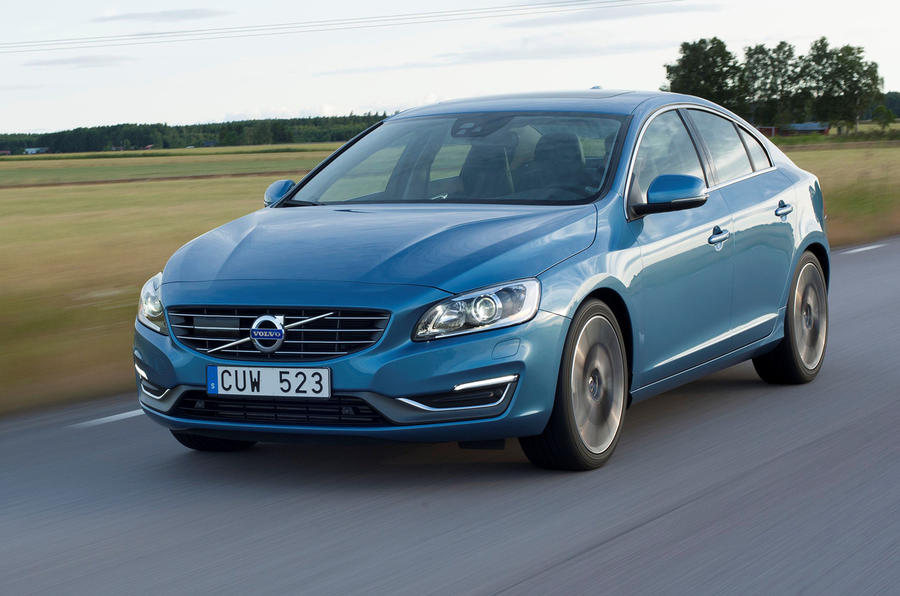What is it?
The petrol half of Volvo’s masterplan is likely to be a more difficult sell than its diesel half-brother. The previous Volvo S60 T6 was powered by a turbocharged 3.0-litre straight-six designed in Sweden, built in Wales and adored practically nowhere. But at least it had the prerequisite half-dozen cylinders. Volvo won't be able to convince everyone – especially beyond Europe’s frugalness – that its four-cylinder replacement is cleaner and clearly better.
Nevertheless, the firm's engineers are adament. Outright capacity is dismissed as a side issue; it’s how much air you can force through what you’ve got that currently captivates the Swedes. To that end, a supercharger and a turbocharger (yup, a ‘superturbo’) bulge from the new compact block and duly suck‘n’blow the new 2.0-litre T6 all the way up to 302bhp from 5700rpm.
Around the near-constant turbulence, Volvo has installed all the familiar mod-cons. Variable valve timing and direct fuel injection are both present and correct, and its engineers insist that better thermal management and friction reduction were high on their list of priorities from day one. The ungainly six-speed auto has also been retired, replaced by a new Aisin-supplied eight-speed torque converter.
Rather than sending its power to all four wheels as before, the initial T6s will be front-wheel drive only. There’s no LSD to help it on its way either. Instead, Volvo has pioneered what it claims is a different breed of traction control, using a unique arrangement of sensors (plumbed directly into the direct injection system) to harness the engine’s torque delivery in a far more nuanced way than has previously been achieved.
What's it like?
Low alcohol lager. A nice idea and not a little worthy, but not as much fun as the real thing. The idea behind the ‘superturbo’ (as it has been known when previously applied by other manufacturers) is that the supercharger works from idle to supply all the low-down, big engine-emulating twist, and then the turbo takes over (via a bypass valve) once sufficient inertia has been summoned up to spin the turbines.
In practice this works seamlessly, and well enough to make the S60 feel purposefully quick. Even with the whiny supercharger, peak torque – all 295lb ft of it – doesn’t appear until 2100rpm, but any delay between throttle and go is usually the fault of the torque converter automatic, which lacks the unflappable, swift-shifting capabilities of its rivals' dual-clutch autos.
The engine, though, doesn’t break stride, and the vocal whimper turns into an almost imperceptible whoosh as the boost swaps from one charger to the other. The thrust is linear and good for 62mph in 5.9sec. It is also remarkably clean. Unofficially, the S60’s emissions are rated at 149g/km CO2; that’s less than a Focus ST, let alone similarly powered opposition.
Unfortunately, that figure, like the highly credible 44.1mpg combined, is intangible, and the T6 could do with a little more. For all its technical cleverness, the engine still lacks the panache and effortless presence of its German rivals. It spends too much time being humdrum at a stroll, and naggingly stressed in a sprint.
Where the turbocharged six-cylinder motors in Audi and BMW’s stall have a fluid, insatiable stride, the S60 never lets you forget that it’s working hard to keep up the pace. The extra power installed in the T6 is also a reminder that Volvo has still not managed to drag the oft-promised driver’s car from the S60. Too often it labours and lurches, even if the new traction control system does an exemplary job of unobtrusively dealing with the inevitable understeer.


















Join the debate
Add your comment
BMW N20 4 Cylinder Turbo
In response to an earlier comment BMW has already got rid of its N/A petrol straight sixes in favour of the N20 4 cylinder turbo. This engine has all of the same problems Autocar seem to find in the new Volvo petrol engine - it is breathless at the top end, rough and uncouth throughout its rev range and not a replacement for a straight six in any circumstances. Having tested a new F30 328i against my old E92 325i the N20 engine is not really that much more economical either. F30 328i over a 15 mile route with dual carriageway, urban roads and country lanes managed 30.6 mpg. E92 325i over precisely the same route did 30.4 mpg. the F30 was a manual and the E92 an automatic. If you drive it hard to use the 245 bhp then it will drink fuel like any 200+ bhp petrol engine. Unfortunately the EU emissions requirements and the assocaited fuel consumption tests are deeply flawed and produce false results. As another commentator said will BMW's 335i achieve 39 mpg? No it won't. Having driven one the best I managed to get on my usual 15 mile test route was 23 mpg. Volvo should be praised for trying something a little different from simply taking the "line of least resistance" and bolting a Mitsubishi turbo onto the side of a mediocre four cylinder like BMW have done.
Volvo seems to always get very negative reviews
Volvo cars seem to always be tested by people who are only interested in performance,so the review has an irritatingly negative tone to it.Volvo's are sensible,high quality cars that attract a buyer requiring refinement.
44mpg?
"but do people really believe it will average 44MPG? Maybe at 60 mph on the motorway."
No, of course not. But I'm sure it'll be a lot more efficient than the old 3.0 straight-six they were using.
No less believable than the 39 mpg BMW claim for the 335i.
Going back to the Mondeo comparison, my point was it shares the same platform, which journos have praised in the past, but never when there's a Volvo badge on the front. Also, the Volvo has far more equipment than a Titanium X Mondeo, and much higher quality materials, so yes, the price does make some kind of sense IMHO.
List price for top-spec Mondeo hatch is nearly £29k, BTW, more than you might imagine.